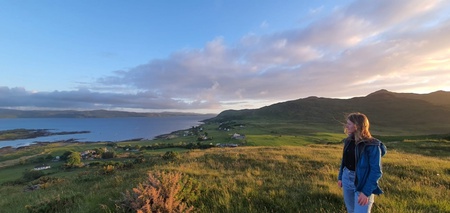PhD student Annabel Everard analyses pollen and plant macrofossils from peat deposits to study changes to Scottish ancient oak woodlands.
What is your research about? For my PhD, I’m analysing pollen and plant macrofossils collected from peat deposits to see how Scottish woodlands have changed in the last roughly 3500 years, focusing on ancient oak woodlands in the North-east and west coast Atlantic rainforests. I’m particularly interested in the representation of woodland flowers within palaeoecological records, and how changes in grazing, burning, climate and woodland management may influence woodland flower diversity.
By improving our understanding of how, and why our woodlands have changed over timescales that cover multiple woodland generations, this research hopes to help avoid the shifting baseline syndrome and guide more informed woodland management and restoration.
What brought you to the University of Aberdeen? I initially came to Aberdeen to study a Masters in Ecology and Conservation in the School of Biological Sciences. I decided to stay in Aberdeen to work with a supervisory team including Dr Ed Schofield and Dr Tim Mighall, within the Department of Geography & Environment, on a project that ties together my interests in environmental change, landscape management and ecological restoration.
What is your background? I did my undergrad in Geography at the University of St Andrews. My interest in palaeoecology developed during my final year dissertation, where I used pollen analysis to investigate long-term vegetation changes in blanket bogs in the Scottish Highlands. This project developed after working as a surveyor assessing deer impacts on upland vegetation, which raised questions over what shaped a now-treeless landscape, and its future potential.
Within my master’s thesis, I researched site-specific factors that influence tree regeneration within Scotland’s native upland birchwoods and Caledonian pine forests, once deer grazing pressure had been removed.


